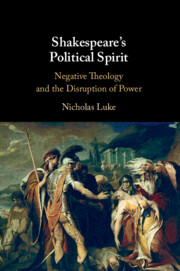Book contents
- Shakespeare’s Political Spirit
- Shakespeare’s Political Spirit
- Copyright page
- Contents
- Acknowledgements
- Introduction
- Chapter 1 Jack Cade in a Time of Protest
- Chapter 2 The Spirit of Caesar and the Second Circle
- Chapter 3 Coriolanus and the Work of Spirit
- Chapter 4 Not to Be – To Be
- Chapter 5 The Tempest and the Spirit of the Air
- Afterword
- Notes
- Works Cited
- Index
Chapter 5 - The Tempest and the Spirit of the Air
Published online by Cambridge University Press: 12 December 2024
- Shakespeare’s Political Spirit
- Shakespeare’s Political Spirit
- Copyright page
- Contents
- Acknowledgements
- Introduction
- Chapter 1 Jack Cade in a Time of Protest
- Chapter 2 The Spirit of Caesar and the Second Circle
- Chapter 3 Coriolanus and the Work of Spirit
- Chapter 4 Not to Be – To Be
- Chapter 5 The Tempest and the Spirit of the Air
- Afterword
- Notes
- Works Cited
- Index
Summary
The Tempest throws us into the midst of a world of tragic repetition, in which usurpation, oppression, and the drive for mastery repeat themselves again and again. The chapter argues that it also offers a precious, if tenuous, escape from tragic history, by calling for a politics of humble disappointment. This tentative path runs through abjuration or negation. The play consistently stages violent and intrusive spectacles that break the characters (and the audience) out of their initial subject positions and into a more outward-looking mode. Such interruptions connect to the tradition of negative theology, in which poorness or nothingness “is the ultimate state of receptivity” (Meister Eckhart). They offer a breath of air from outside the masterful self, a sliver of distance from the tragic past. In particular, the play institutes a theatrical form of collectivity through the isle’s inclusive dramatic “air”. It draws us, as well as the sovereign figure of Prospero, into a broader dramatic life-force or “intersubjective phenomenology” (Schalkwyk). Indeed, in the Epilogue, the sovereign power is subject to the many; subject to audience’s judgment, pleasure, and approval. It is this recognition of mutual need (Plato) that opens the vision of a renewed political community.
Keywords
- Type
- Chapter
- Information
- Shakespeare's Political SpiritNegative Theology and the Disruption of Power, pp. 190 - 230Publisher: Cambridge University PressPrint publication year: 2024

